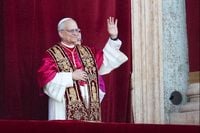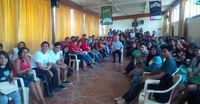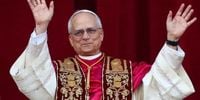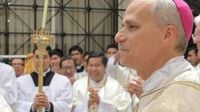Cardinal Robert Francis Prevost of the United States, age 69, was presented as the 267th Pope of the Church on Thursday, May 8, 2025, choosing the name Leo XIV. He succeeds Pope Francis, who died on April 21, 2025. According to the Vatican, Prevost is the first Augustinian Pope.
Prevost's episcopal motto is In Illo uno unum (In one, we are one), words that Saint Augustine pronounced in a sermon to explain that, although Christians are many, in the one Christ, they are one. During the last hospitalization of Francis, the new pope presided over the rosary for the health of his predecessor on March 3, 2025, in St. Peter's Square.
Born on September 14, 1955, in Chicago, Illinois, Prevost is the son of Louis Marius Prevost, of French and Italian descent, and Mildred Martínez, of Spanish descent. He has two brothers, Louis Martín and John Joseph. In 1977, Prevost entered the novitiate of the Order of Saint Augustine in the province of Our Lady of Good Counsel in Saint Louis. He made his first profession on September 2, 1978, and issued his solemn vows on August 29, 1981. He studied at the Catholic Theological Union in Chicago, where he graduated in theology. At 27, he was sent by his superiors to Rome to study canon law at the Pontifical University of Saint Thomas Aquinas and was ordained a priest on June 19, 1982.
From 1985 to 1986, Prevost worked in a mission in Chulucanas, Peru. In 1987, he completed his doctorate with a thesis on the role of the local prior in the Order of Saint Augustine. The same year, he was elected director of vocations and missions for the Augustinian province of Mother of Good Counsel in Olympia Fields, Illinois. In 1988, he was sent on a mission to Trujillo, Peru, as director of the joint formation project for Augustinian aspirants. He served as prior of the community from 1988 to 1992, formation director from 1988 to 1998, and teacher from 1992 to 1998. He also served as judicial vicar from 1989 to 1998 and professor of canon, patristic, and moral law at the San Carlos and San Marcelo Major Seminary.
In 1999, he was elected prior provincial of the Augustinian Province of Mother of Good Counsel in Chicago, and two and a half years later, he was confirmed as prior general at the Ordinary General Chapter of the Order of Saint Augustine, being re-elected in 2007 for a second term. In October 2013, he returned to his Augustinian province in Chicago, serving as formation director at the Augustinian convent and as first counselor and provincial vicar until Pope Francis appointed him on November 3, 2014, as apostolic administrator of the Peruvian diocese of Chiclayo, elevating him to the episcopal dignity as titular bishop of Sufar. Prevost entered the diocese on November 7, 2014, in the presence of Apostolic Nuncio James Patrick Green, who ordained him bishop a little over a month later, on December 12, during the feast of Our Lady of Guadalupe at the Cathedral of Santa Maria.
On September 26, 2015, he was appointed bishop of Chiclayo by the Argentine pontiff and, in March 2018, he was elected second vice-president of the Peruvian Episcopal Conference, where he was also a member of the Economic Council and president of the Culture and Education Commission. In 2019, again by Francis's decision, he was included among the members of the Congregation for the Clergy on July 13, 2019, and the following year among the members of the Congregation for Bishops. In April 2020, he received the pontifical appointment as apostolic administrator of the Peruvian diocese of Callao. On January 30, 2023, Francis called Prevost to Rome to serve as prefect of the Dicastery for Bishops and President of the Pontifical Commission for Latin America, promoting him to archbishop. In September of the same year, he was made a cardinal, assigned to the diaconate of Santa Monica. Prevost took office on January 28, 2024, and as head of the dicastery, he participated in the last apostolic trips of Francis and the first and second sessions of the 16th Ordinary General Assembly of the Synod of Bishops on Synodality, held in Rome from October 4 to 29, 2023, and from October 2 to 27, 2024, respectively. Finally, on February 6, 2025, Prevost was promoted to the order of bishops, obtaining the title of suburbicarian church of Albano.
Prevost's election has significant implications, especially as he becomes the first North American and Peruvian pontiff, having obtained Peruvian nationality in 2015. His reputation as a moderate and bridge-builder may be crucial at a time when the Church appears deeply divided. He has spent one-third of his life in the United States, while the rest has been divided between Europe and Latin America—the same regions where Jorge Mario Bergoglio, the former pope, hailed from.
The Italian newspaper La Repubblica referred to him as "the least American of Americans" due to his moderate tone. The prospect of having a North American pope had been dismissed for centuries in Rome due to geographical distance and geopolitical decisions that raised concerns about potential CIA interference in the Church.
Prevost, who served as Archbishop Emeritus of Chiclayo, left Peru to join the Vatican government, where he directed the important Dicastery for Bishops, which plays a significant role in advising the pope on Church leadership appointments. Following the death of Francis, Prevost remarked that there remains much to be done in transforming the Church. "We cannot stop, we cannot go back. We must see how the Holy Spirit wants the Church to be today and tomorrow, because the world in which the Church lives today is not the same as the world of 10 or 20 years ago," he said last month to Vatican News.
In his inaugural address, Leo XIV made comments in Spanish, addressing his "dear diocese" in Peru. He emphasized the need for a synodal Church that seeks peace and is close to those who suffer. Prevost's mission-driven approach and commitment to social justice reflect a vision of an inclusive Church that is open to dialogue and actively serves the marginalized.
As he embarks on this new journey, Pope Leo XIV's leadership will undoubtedly be closely watched as he navigates the complexities of modern-day challenges within the Church, aiming to uphold its core values while addressing contemporary societal issues.




